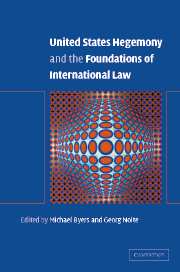Book contents
- Frontmatter
- Contents
- List of contributors
- Preface
- Introduction: the complexities of foundational change
- PART I International community
- PART II Sovereign equality
- PART III Use of force
- PART IV Customary international law
- PART V Law of treaties
- 13 The effects of US predominance on the elaboration of treaty regimes and on the evolution of the law of treaties
- 14 US reservations to human rights treaties: all for one and none for all?
- 15 Comments on chapters 13 and 14
- PART VI Compliance
- Conclusion
- Index
13 - The effects of US predominance on the elaboration of treaty regimes and on the evolution of the law of treaties
Published online by Cambridge University Press: 13 July 2009
- Frontmatter
- Contents
- List of contributors
- Preface
- Introduction: the complexities of foundational change
- PART I International community
- PART II Sovereign equality
- PART III Use of force
- PART IV Customary international law
- PART V Law of treaties
- 13 The effects of US predominance on the elaboration of treaty regimes and on the evolution of the law of treaties
- 14 US reservations to human rights treaties: all for one and none for all?
- 15 Comments on chapters 13 and 14
- PART VI Compliance
- Conclusion
- Index
Summary
History shows that it is very generally much more efficient in the long run for States to “apply power within the framework of an institution or legal system,” rather than to resort to raw military force or economic coercion. The most obvious reason for this is that turning a relationship between two or more entities of unequal power which is – ex hypothesi – initially based upon sheer material power into a relationship which enjoys the recognition and protection of the law inevitably legitimizes the factual domination exerted by the more powerful State over the other(s). This transformation entitles the former to resort to the means put at its disposal by the international legal system in order to enforce the – now legal – obligations owed to it by the latter, within the “neutral” framework of international law. The very notions of “force” or “power” are thereby obliterated to a large extent. It thus seems particularly relevant, against this background and in the framework of the present project, to inquire into the possible impact of the supremacy enjoyed by the United States in international relations since the end of the Cold War on the formation of international law through one of its most classical means, the conclusion of treaties. Treaties indeed remain one of the most significant and privileged ways to “produce” international legal norms nowadays.
- Type
- Chapter
- Information
- United States Hegemony and the Foundations of International Law , pp. 363 - 391Publisher: Cambridge University PressPrint publication year: 2003
- 4
- Cited by



